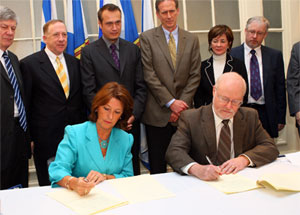 |
| Dr. Traves and Minister Casey sign the new memorandum of understanding as representatives from Nova Scotia's universities look on (Nick Pearce photo) |
Winter may officially be over, but that didn’t stop the Nova Scotia government from announcing a freeze that will benefit all university students in the province.
Monday morning at Province House, Dalhousie University President Tom Traves, representing the Council of Nova Scotia University Presidents, and Education Minister Karen Casey signed a new memorandum of understanding between the Province of Nova Scotia and its universities. In it, the province pledges to spend $180 million more in direct funding to its 11 universities over the next three years and establish a $66 million Nova Scotia University Student Bursary Trust.
For students, the increase in funding means an across-the-board tuition freeze until 2011.
“No student – whether from Nova Scotia, Canada or any other country; whether in an undergraduate, graduate or professional program – will pay more in tuition for the next three years,” said Minister Casey at the announcement.
At a glanceTuition freeze: No new tuition increases for the next three years. Applies to all undergraduate, graduate and professional programs. Nova Scotia bursary program: Applies to Nova Scotia students studying at Nova Scotia universities. A maximum of $761 in 2008-09, $1,022 in 2009-10 and $1,283 in 2010-11. Out-of-province students: Benefit from the tuition freeze and will receive a $261 bursary in 2010-11. |
While not eligible for the same reductions, out-of-province students will still benefit from the tuition freeze and will also receive a bursary of $261 in 2010-11. This is so the differential in tuition between students from Nova Scotia and those from elsewhere does not exceed $1,000.
Answering questions about the differential, Minister Casey said the province would like to do more for its out-of-province students, but is not in a position to do so until the federal government changes its funding formula for post-secondary education. Currently, the Government of Canada distributes transfer payments on a per-capita basis, not per-student, which hurts provinces like Nova Scotia where more than 30 per cent of students come from outside the province.
DSU president Mike Tipping, present at the event, said that while he’s concerned by the long-term implications of the differential, the announcement is largely good news for students. “This is a clear demonstration of the government’s commitment to collaborating with students to make university more affordable,” said Mr. Tipping, who is also chair of the Alliance of Nova Scotia Student Associations. “This puts us squarely on the right path, but we have a long way to go before we can use education to tackle the problems that face Nova Scotia.”
Dr. Traves, speaking at the event, said the new memorandum is “a tremendous vote of confidence and a terrific investment in our universities.” The three-year funding arrangement allows universities like Dalhousie a better opportunity to plan ahead and confront the challenges they face with greater assurance, he added.
